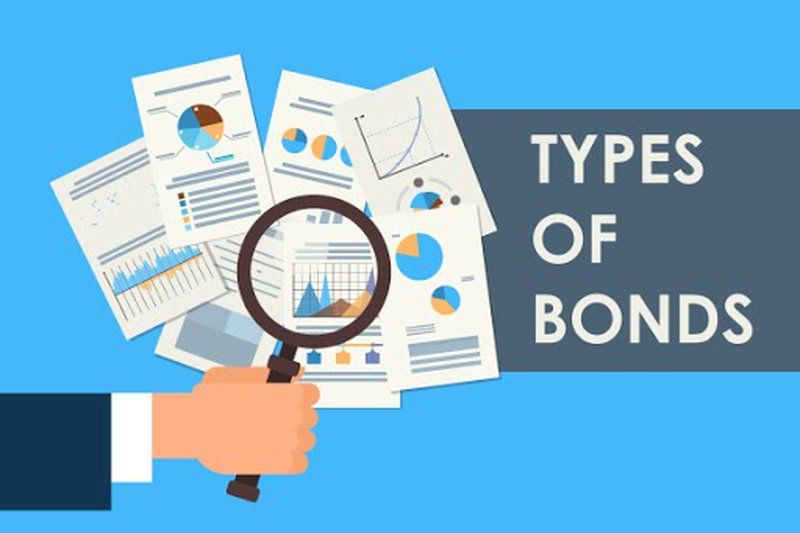At least five different types of bonds exist. Vendors, purposes, purchasers, and risk-to-reward ratios all vary.
Key Takeaways
- Treasury, savings, agency, municipal, and corporate bonds are the five basic types of bonds.
- Sellers, purposes, purchasers, and risk-to-reward ratios are all unique to each bond.
- You can acquire securities based on bonds, such as bond mutual funds if you want to take benefit of bonds. These are compilations of various bond types.
- One of the differences between bonds and bond funds is that individual bonds are less risky than bond mutual funds.
U.S. Treasury Bonds
The most important bonds are Treasury bills, notes, and bonds issued by the Treasury Department. They determine the rates on all other long-term, fixed-rate bonds. The Treasury sells them at auction to fund the federal government's operations. On the secondary market, these bonds are also resold. They are the safest since the U.S. government guarantees them. As a result, they also provide the lowest return. Almost every institutional investor, firm, and sovereign wealth fund owns a stake in them. Treasury Inflation-Protected Securities are inflation-protected Treasury bonds.Savings Bonds
The Treasury Department also issues savings bonds. Individual investors are supposed to buy these bonds. Individuals can afford them since they are supplied in small enough quantities. I bonds are similar to savings bonds but are inflation-adjusted every six months.Agency Bonds
Bonds guaranteed by the federal government are sold by quasi-governmental agencies such as Fannie Mae and Freddie Mac.Municipal Bonds
Bonds guaranteed by the federal government are sold by quasi-governmental agencies such as Fannie Mae and Freddie Mac. A number of different cities issue municipal bonds. They are tax-free; however, their interest rates are slightly lower than corporate bonds. They pose a somewhat higher risk than government bonds issued by the federal government. Cities do go bankrupt from time to time.Corporate Bonds
A wide range of businesses issues corporate bonds. They pay greater interest rates than government-backed bonds because they are riskier. The representative bank sells them. There are three types of corporate bonds:- Junk bonds, also referred to as high-yield bonds, are corporate bonds issued by companies with significant default risk. They offer greater interest rates to compensate for the risk.
- Preferred stocks are officially stocks, yet they have the same characteristics as bonds. They make regular payments to you in the form of a predetermined dividend. In the event of a bankruptcy, they are marginally safer than stocks. After bondholders, but before common stockholders, holders are paid.
- Certificates of deposit are similar to bonds that your bank issues. You essentially lend your money to the bank for a set length of time in exchange for a guaranteed fixed rate of return.
Bond-Based Securities
To profit from the benefits of a bond, you don't have to buy one. Bond-based securities are also available for purchase. Bond mutual funds, for example, are collections of several sorts of bonds. Individual bonds are less hazardous than bond mutual funds, which is one of the contrasts between bonds and bond funds. When an individual bond matures, the principal amount is refunded to the holder if there are no defaults. If interest rates fall, bond funds expose investors to the danger of losing their money. Bond exchange-traded funds are another type of bond security (ETFs). They work similarly to mutual funds, except they don't own the bonds they invest in. On the other hand, ETFs track the performance of different types of bonds. They pay out based on how well they perform. Bond-based derivatives are complex investments whose value is determined by the underlying bonds. The following are some of them:- A buyer of options has the right, but not the responsibility, to exchange a bond at a specific price on a specific date in the future. A "call option" is the right to acquire a bond, whereas a "put option" is the right to sell it. They are exchanged on a regulated market.
- Futures contracts are similar to options in that they obligate players to complete the transaction. A stock exchange is where they are bought and traded.
- Forward contracts are similar to futures contracts, except that they are not traded on a stock market. Instead, they are traded over-the-counter between two persons or through a bank. They are tailored to the specific requirements of the two parties.
- Bundles of house loans are used to create mortgage-backed securities. They, like bonds, pay interest based on the value of the underlying assets.
- Auto loans and credit card debt are used to create collateralized debt obligations (CDOs). They also contain corporate bond bundles.
- A one-year corporate bond package is asset-backed commercial debt. The value is determined by the market value of the underlying commercial assets. Real estate, corporate fleets, and other commercial property are examples.
- Bondholders can use interest rate contracts to switch their future interest rate payments. They happen when a fixed-interest bond holder meets a flexible-interest bondholder. They are exchanged on an over-the-counter (OTC) basis.
- Total-return swaps are similar to interest rate swaps, but the payments are made based on bonds, a bond index, an equity index, or a group of loans.


